2024 has been a year of really long games which I start but rarely finish. That’s sort of my fault – I have a bad habit of not completing tasks in general – but I think part of the reason is a general sense of burnout I get. I struggle to stay engaged with a gaming experience long enough to see it through to credits, with some exceptions (my beloved Dragon’s Dogma 2 springs to mind right away). As such, this ‘Initial Vibe’ segment of the blog I sometimes do is a good way to give my thoughts on games I’m opinionated about, without the additional pressure to needing to actually finish it. It’s me conceding to my nature, sure, but at least I won’t let my thoughts disappear.
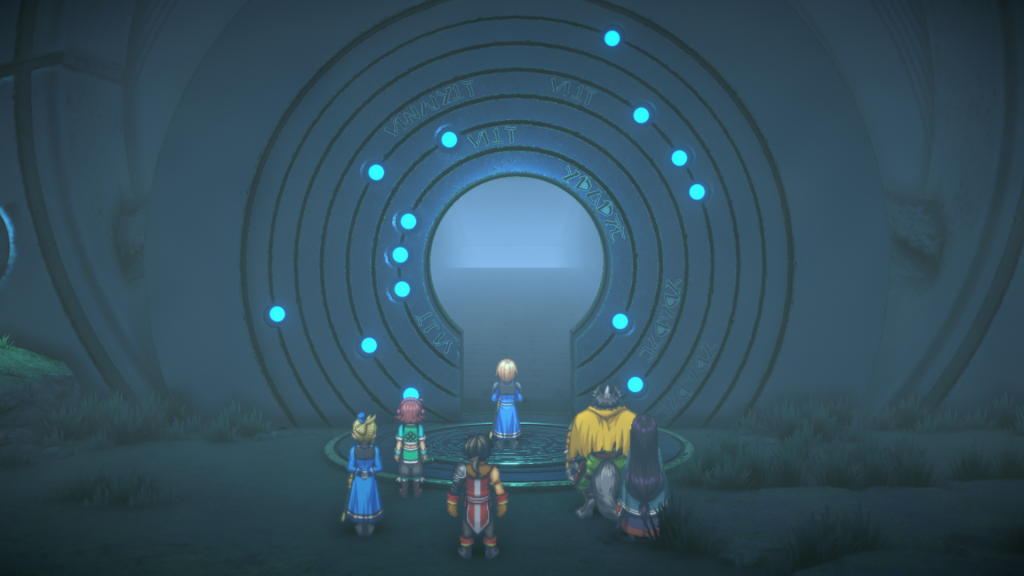
I’m here today to talk about a really cool game that’s actually quite surprised me: Eiyuden Chronicle: Hundred Heroes. I didn’t know about it until only a couple months ago when it was talked about in what I believe was a Nintendo Direct. I already thought it looked and sounded really cool, but THEN I found out it was coming out on XBOX Game Pass day one, so of course I was in the front row seats.
I didn’t realise any of the context surrounding this game until I was already playing it. It isn’t an established series, as I’d originally assumed, but rather a spiritual successor to another well-known collection of JRPGs called Suikoden, led by its creator, Yoshitaka Murayama. It started its life as a Kickstarter campaign, and had the third most successful run for a video game on the website, just behind Shenmue 3 and Bloodstained: Ritual of the Night. I had gone into this game assuming it was a middle-market release, but it turned out it had already amassed quite a following, and as such had a lot of expectation riding on its success.
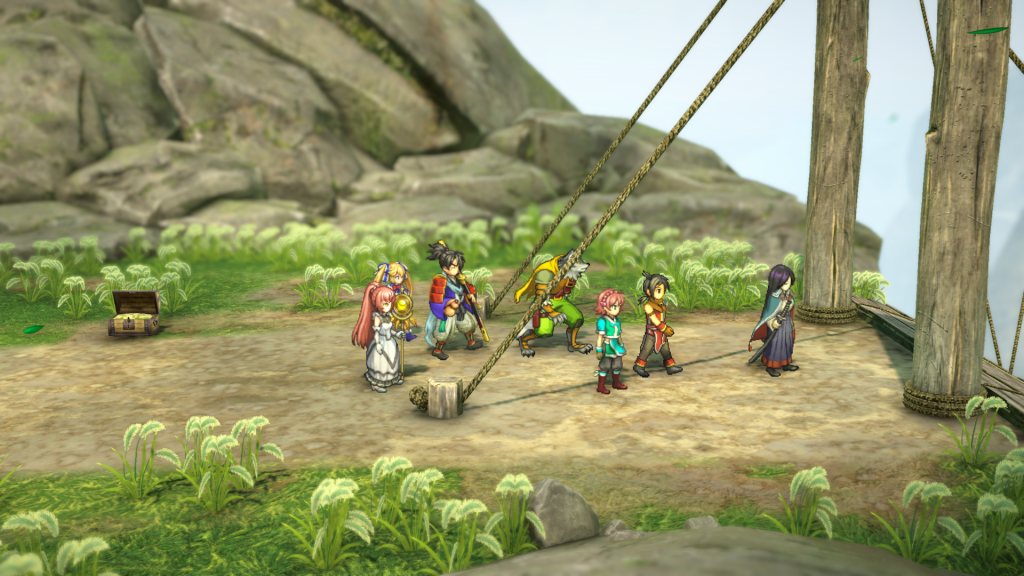
First off, this game is just so unbelievably charming. It opens with the player character, Nowa, throwing a rock at an eagle hunting a little bird, and it maintains that general goodheartedness from that moment on. Some might call our protagonist bland, but I think he’s very sweet, though you do need to stick with him a little while before he reveals his sillier side. For all the kind gestures and helpful attitude, he’s a bit of a goober, and I appreciate that side of him. He just wants to sort out everyone’s problems, and usually ends up matching their respective energies depending on the situation. At one point, he met a magical girl character, and by the end of his assisting her with a monster slaying quest, was doing anime-style callouts alongside her. That’s the good shit for my soul.
Beyond that, the vibes here are impeccable. Towns are littered with NPCs walking around, minding their business, going about their daily activities. Kids play hide and seek, guards slack off at their post, farmers toil the fields, and most of them have a little something to say. Usually it’s canned dialogue like “damn the empire, they’ll get what’s coming!” or “check out the item store if you needs items”, but there’s a certain liveliness to the way they generally exist within the space that I enjoy. Not to mention the various pets that hang out in every area, from cats and dogs to guinea pigs, and lots of them have weird and funny names which I can only assume come from a Kickstarter stretch goal.

In general, there’s a palpable humanity to everything here. There are a lot of clear Kickstarter influences, like a huge portrait in the main headquarters which is virtually unmissable in cutscenes, and I don’t know how true this is, but I’m guessing the guy is a high-level backer who got put into the game as a reward for donating to the project. In all respects, you can tell this game is a labour of love, and I think that’s really nice.
The visuals are just gorgeous; a blend of 3D environments housing 2D pixel art, a la Octopath Traveler, though on a slightly tighter budget. It comes together nicer than you’d expect, and I think part of the reason is the attention to detail in its lighting and depth of field. It’s really impressive, and I found myself screenshotting constantly while playing, which is usually a good sign.
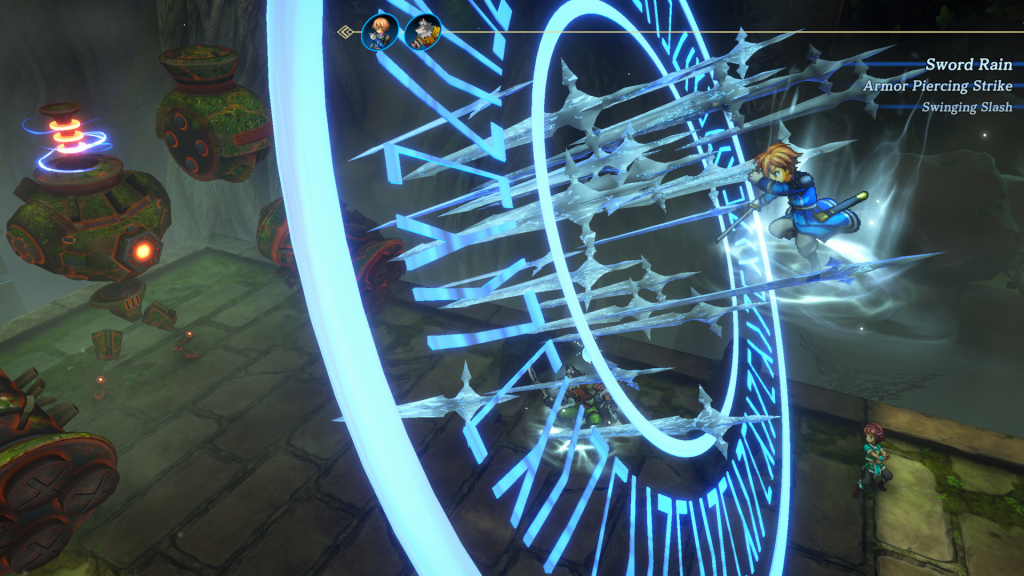
Characters are rendered beautifully, with incredible sprite animations, making each of them look and feel distinct. I have collected around 20 or so of the potential 100 party members promised by the game’s title, and I’m pretty confident I could distinguish them all in a lineup. I’d struggle to recollect their names necessarily – there’s quite a lot of them – but I would remember their fighting styles, their personalities, their relations to other characters, and so on. Many of them fulfil tropes of the genre, but the fact that they are so distinct while each fitting the general vibe of the setting and narrative is pretty crazy, all things considered. Of course, there’s the possibility that variety will stagnate the further in I go, but it’s still cool as of now!
These characters are also quite distinct in a gameplay sense too. There’s a good mix of weapon types, from bare fists to mage staffs, katanas to crossbows, and everything in between. These have an effect on attack reach, meaning the way you choose to place characters in the party formation is genuinely important. For example, monks like Lian are light on their feet, so they can hit any enemy provided they’re positioned in the front row, while katana wielders like Mio or Iugo won’t be able to attack from the back of the pack (bars), but moving them forward makes them more likely to be targeted for attacks. It’s a careful balancing act, and one that’s fun to explore.
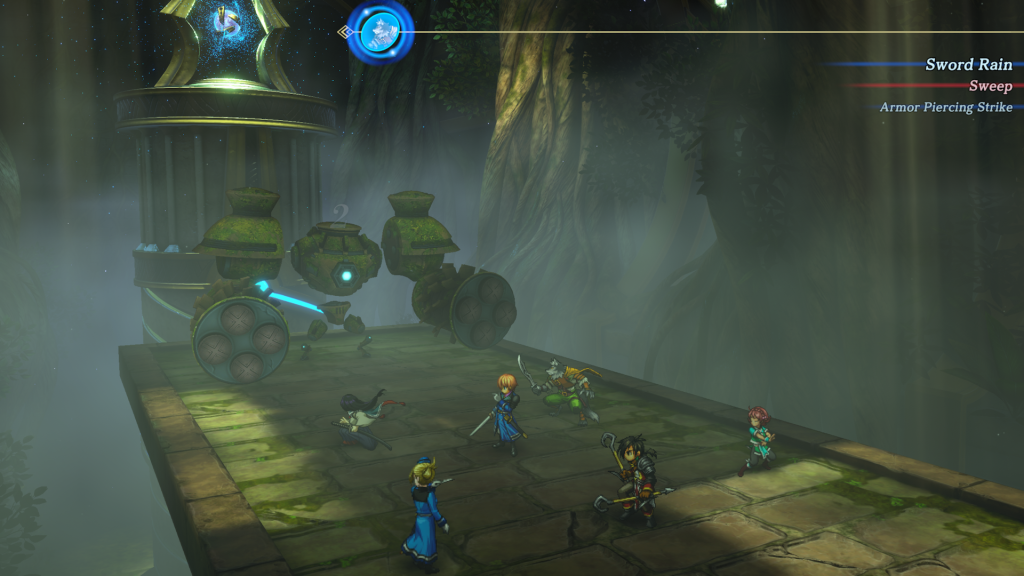
I also like how many of the game’s combat mechanics go more or less unexplained. It’s nice to be taught these things organically, based around making mistakes and learning from them rather than being led carefully by the hand through each encounter. It’s straightforward enough to never get frustrating, but not so simple that it becomes dull.
The quest designs are pretty open-ended in general, actually. After the prologue section, you’re more or less dumped into the world and asked to go find allies to join up with the Watch, the mercenary group you work for, and how you go about that isn’t really explained. There’s no map markers to follow; just a world to explore, which you can in whatever way to see fit. It’s a level of freedom I don’t tend to expect from a JRPG of all things, but is very welcome! It makes the journey feel personal, and the party I acquire unique, rather than an arbitrary selection. It’s an approach which rewards careful observations, turning you into a sort of talent scout but for scary-looking potential friends.
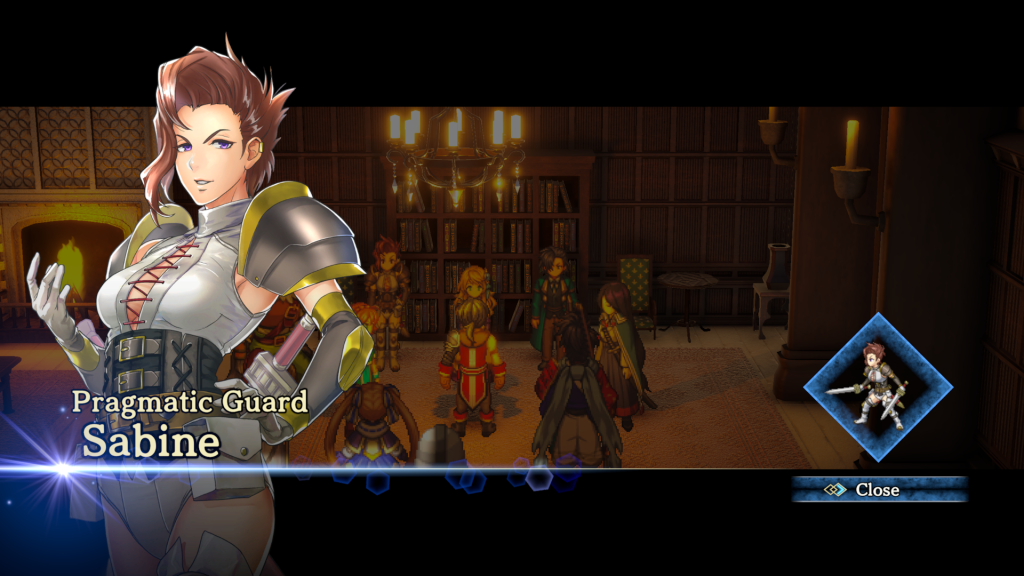
So we’ve got turn-based combat and overworld exploration: what else? Well, after a certain point you’re introduced to a Fire Emblem-esque battle strategy game that’s actually pretty simplistic, though the fact it’s in here at all is pretty cool all on its own. It adds a certain gravitas to what would otherwise be just another combat encounter. After that, you’re met with a base-buidling system, wherein the resources you collect and the allies you find in the overworld can be invested into provisions for your base of operations, and new structures to further your resistance cause, and that’s kinda cool too. I guess I just wasn’t expecting such a range of gameplay mechanics, but I respect the ambition on display here. Time will tell if it’s still cool by the end, but I’d like to think it will be.
I mentioned a resistance you eventually have to form, which leads into the story of Eiyuden Chronicle. It begins as a standard JRPG adventure, where an unlikely party of troublemakers come across an ancient artefact beyond their understanding, which acts as the catalyst for a wider narrative that affects the entire world. It is definitely that, by all accounts, but only for the first hour or so. Beyond that is a story of nations on the brink of war; political subterfuge, wicked schemes, and power grabs. It frames the war not as a clashing of ideologies, but rather as the straightforward selfish acts of noble figures, and depicts their pawns, the ordinary folk, caught in the ensuing conflict.
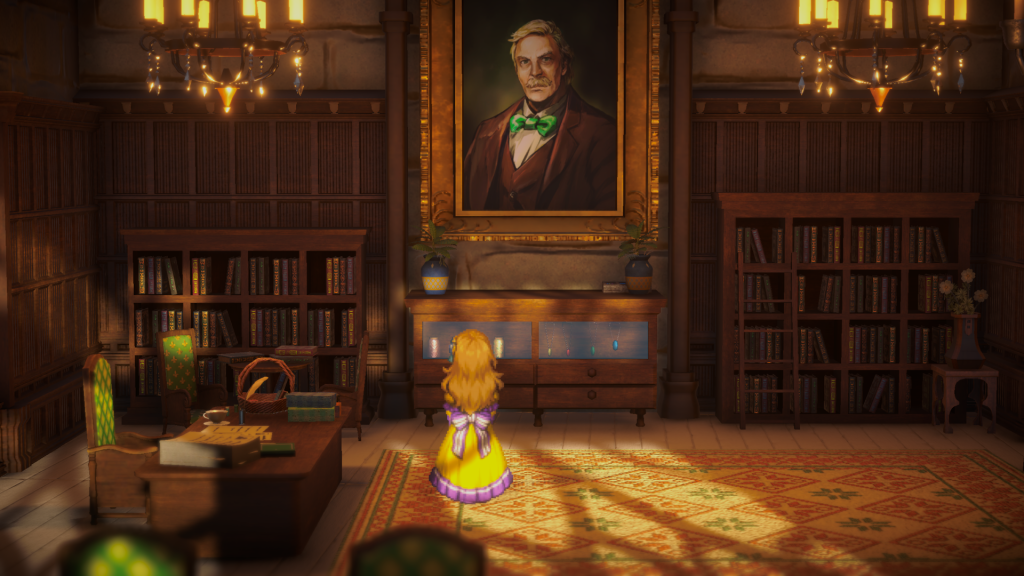
Nowa essentially stumbles into the role of high-ranking army commander, and eventually leader of the resistance, not because he’s the chosen one or whatever, but rather because he’s simply an unambiguously good person, and his unshaken resolve is recognised by the lady in charge who refuses to play the games of the warring nobility. His rival, Seign, actually is a noble, and despite them hitting it off early on, the two end up on opposing sides, simply because Seign feels his place is with the Empire, and it is his duty to uphold his family name. It’s a pretty bleak state of affairs, where otherwise good people are take advantage of by those who seek to weaponise that good will for their own selfish designs. It’s a surprisingly effective anti-war stance that recognises these kinds of conflicts as brought upon by those with power over these nations rather than the people living within them, and the way nationalism and tradition can be used to legitimise these conflicts.
The game plays a pretty effective trick but having you explore the world map of your own volition early on, only to have the various towns and settlements you once visited be swept up in the beginnings of this war, transforming these once peaceful areas into pawns in the battles to come. When someone comes rushing through the palace doors to exclaim that the Empire has seized Werne Village, I remember the time I visited once, stayed at their inn, and chatted with the locals. It wasn’t a memorable place, but it did exist, and now it doesn’t…at least not in the same way. I like it! It makes me feel sad!
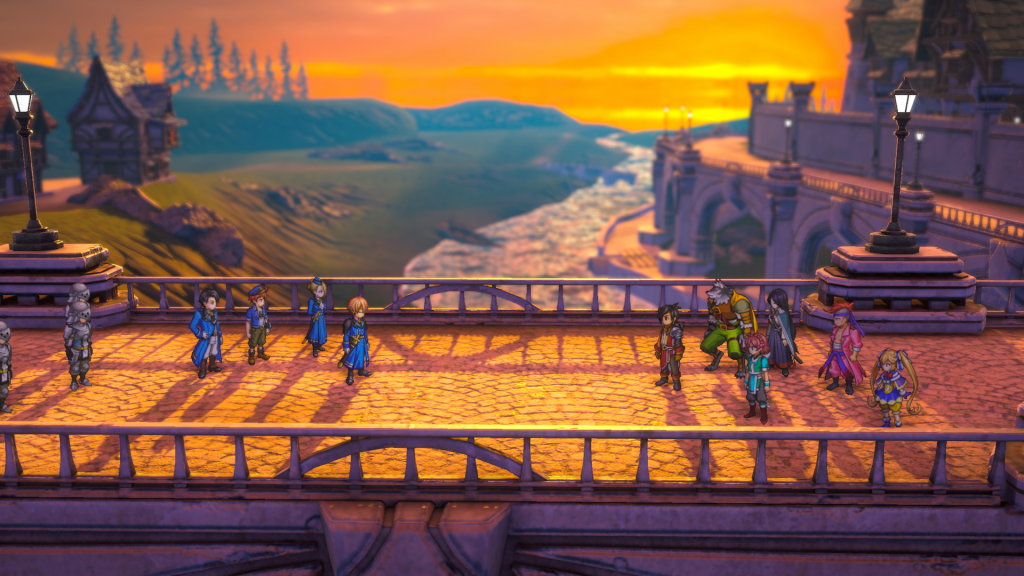
I guess that’s all I have to say about Eiyuden Chronicle: Hundred Heroes at the moment. If I stick with it to the end, I might write a review for it. If not, then I can say I’ve had a really good time with the game thus far, and I want to see where it goes from here. It’s a really pleasant surprise, and it’s definitely emboldened my resolve in seeking out games that I wouldn’t usually give a chance to. Onwards and upwards! Grum will be free!!!
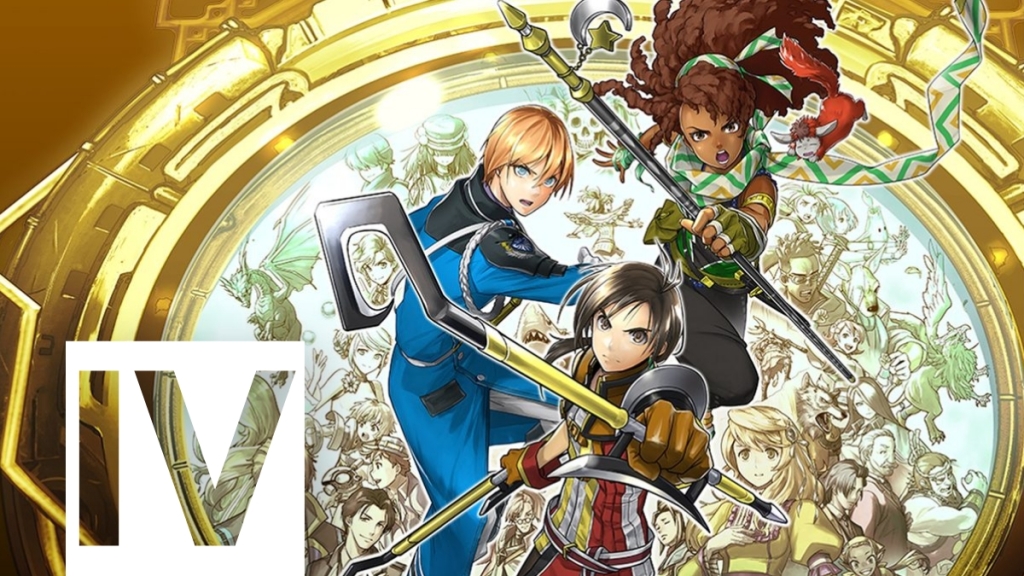
Leave a comment